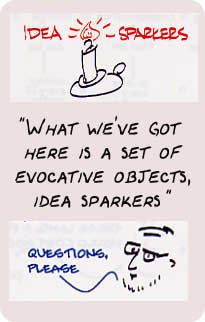|
|
Katalina Groh, Larry Prusak: Some of the world's leading thinkers |
| Storytelling: Scientist's Perspective: John Seely Brown |
 |
What
I would like to do is to throw out some ideas. I want to create some evocative
objects to think with, as opposed to giving you a very formal type
of a talk. I think there is a smattering of ideas here. Some of these will
connect with you, and some of them wonít, but I hope that there will be
something of particular interest to each person here. I can guarantee that
it wonít be the same thing. So this is meant to be a set of idea sparkers.
I have become interested over the last couple of years about how in fact you actually capture and leverage knowledge without killing it. It is easy to become over-zealous in trying to capture it, with the beautiful advantage of killing everything. It is also possible not to pay enough attention to capturing anything, and so you lose all the value. There is a tricky balance. In fact, it goes right back to the notion of organizational architecture, that I will come back to, near the end of my talk. |
| And so what I would like
to do is start out with a little bit about the context in which we all
find ourselves and the accelerating pace of change. And then the key is
survival in this kind of confusing world. Everybody here knows about communities
of practice but I want to talk a little bit more about that, and come back
to learning, to knowledge ecologies, to pick up some of what Steve was
talking about yesterday, about a potential fundamental paradox in knowledge
management, and a new notion, extending Dorothy Leonardís notion of creative
abrasion in terms how we want to structure our enterprises in order to
create the right kind of a balance between stimulating knowledge and losing
knowledge.
Knowledge management in the U.S. and Japan In effect, I found it very interesting, recently, and I think various folks here realize that in the US, there may be a waning interest in knowledge management, just about the same time that when you go to Japan, you find that there is a very interesting movement starting up in Japan. That is that a couple of decades ago, Japan decided to really focus on, and paid very close attention to, Edward Deming and the total quality management movement. And that is what they used to rebuild their entire country. And what is happening today is a shift from a focus on quality to a focus on knowledge. And can you really think through knowledge management, as a way to rebuild the country, not just the enterprise? And so I think youíre going to see increasing emphasis coming out of the East on these types of topics. |
| Books and videos on storytelling *** In Good Company : How Social Capital Makes Organizations Work by Don Cohen, Laurence Prusak (February 2001) Harvard Business School Press *** The Social Life of Information, by John Seely Brown, Paul Duguid (February 2000) Harvard Business School Press *** The Springboard : How Storytelling Ignites Action in Knowledge-Era Organizations by Stephen Denning (October 2000) Butterworth-Heinemann *** The Art of Possibility, a video with Ben and Ros Zander : Groh Publications (February 2001) |
| The views expressed on this website are those of the authors, and not necessarily those of any person or organization |
| Site optimized in 800x600: webmaster CR WEB CONSULTING |
|
|
|
|